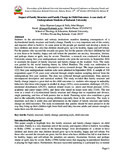Impact of Family Structure and Family Change in Child Outcomes: A case study of Undergraduate Students of Kabarak University

View/
Date
2018-10-14Author
Langat, Julius Kiprono
Murgor, Nelly Jebet
Metadata
Show full item recordAbstract
Students in the universities and tertiary institutions manifest damning consequences of a
dysfunctional family structure and family change. Family is a very important unit of the society
and requires effort to build it. At some point in life people get married and develop a desire to
have children and desire also that children should grow up to be healthy, happy and self reliant.
For the parents who succeed the rewards are great; but for the parents who have children but fail
to rear them to be healthy, happy and self reliant the penalties are anxiety, frustration, friction,
and perhaps shame or quilt, may be severe. Therefore, a research was conducted at Kabarak
University among first year undergraduate students who joint the university in September 2016
to ascertain the impact of family structure and family change on the students’ lives. The study
was guided by the social learning theory by Albert Bandura. The study was undertaken in
Kabarak University. It adopted a descriptive survey research design. The target population was
1222 first year undergraduate students who were admitted in September 2016. A sample of 310
respondents aged 17-24 years were selected through simple random sampling derived from the
undergraduate first year students. The data was collected through questionnaire. Data analysis
encompassed descriptive and statistical method. The study revealed that family structure and
family change impacts a great deal on the child outcomes i.e. students who engage in unhealthy
behaviors like those who engage in alcohol & drugs (10%), socio-economic challenges (25.2%),
emotional disturbances (29.2%), medical related issues i.e. ulcers and blood pressure (12%),
academic and career issues (10%), and those who raised no issues were only 13.6%. The rest
were as a result of a dysfunctional family structure and change due to separation and divorce,
single parenting, and loss of both parents due to death. Parenting styles also contribute a great
deal to the unhealthy behaviors among children especially those in the university. The study is
important such that it yields data and information on the impact of family structure and family
change on child outcomes. The study recommends that parents should be more proactive in the
way they bring up their children right from birth until they become adults and mature enough to
make their own life decisions.
